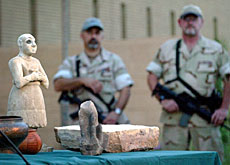Swiss deal blow to art traffickers

Parliament has finally decided that Switzerland should no longer constitute a safe haven for art traffickers.
The House of Representatives has approved legislation that brings Switzerland into line with the 1970 Unesco Convention against cultural goods trafficking.
Parliament decided on Tuesday to extend the timeframe for reclaiming stolen works of art to 30 years from the current five years enshrined in Swiss law.
The Federal Office for Culture had proposed the new legislation because Switzerland – the world’s fourth largest art market – had earned a reputation for being a transit centre for stolen works of art.
Until now, Swiss law has treated cultural goods no differently to ordinary merchandise. With the new legislation, which has taken over ten years to be approved, the laundering of stolen artworks should also disappear.
A small minority in parliament fought in vain to keep the statute of limitations down to 20 years. “We have to defend the interests of art dealers,” said Theophil Pfister of the rightwing People’s Party.
However, the centre-left warned that shortening the period would only lead to other nations questioning Switzerland’s commitment to the fight against art trafficking.
Those who buy stolen art in good faith will receive compensation, but only the equivalent of what they paid for the object. The House chose not to indemnify beyond this limit, wishing to avoid any speculation based on market value.
Interior minister Pascal Couchepin pointed out that it wouldn’t be fair to the original owners if more were paid out. “These people didn’t just lose something they owned, but they also have to shell out the price it was sold at as compensation for the new owner,” he said.
Big issue
Internationally, stolen art is the third biggest illegal market behind drugs and the arms trade, according to Interpol and Unesco. But art trafficking has only became a big issue in Switzerland in recent years.
It was only when looted art from the Second World War became front-page news that the Swiss realised how much of a problem it could be. Recent events in Iraq reinforced this point.
“The looting of Iraq’s cultural heritage shows just how important this legislation is,” said Couchepin.
The actual impact of the new law should only affect a very specialised area of the art market, according to Unesco representatives.
Traders dealing in archaeological and ethnological art will probably have to pay more attention to the origin of the pieces they are selling. But traditional or modern art dealers will probably feel little impact.
Art trafficking could lead to sentences of up to two years in jail and fines of up to SFr200,000 ($153,000). Dealers and auction houses that fail to carry out due diligence checks or who hinder investigations can expect fines of up to SFr20,000.
The new law should go into effect in 2004.
swissinfo with agencies
Parliament has approved new legislation aimed at preventing art trafficking, bringing Switzerland into line with a 1970 Unesco Convention.
The foreign owner of stolen artwork will now have 30 years to claim it back.
The Federal Office for Culture, which drew up the new law, said it was necessary because Switzerland had earned a reputation as a transit centre for stolen works of art.
People convicted of art trafficking could face up to two years in jail and fines of up to SFr200,000.

In compliance with the JTI standards
More: SWI swissinfo.ch certified by the Journalism Trust Initiative



You can find an overview of ongoing debates with our journalists here . Please join us!
If you want to start a conversation about a topic raised in this article or want to report factual errors, email us at english@swissinfo.ch.